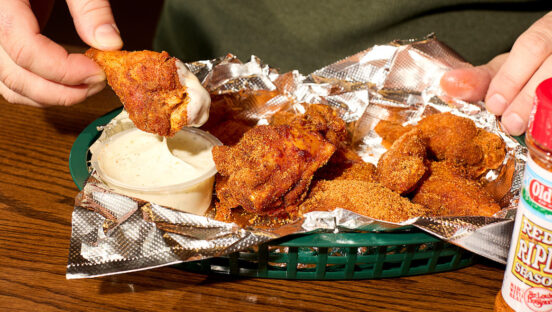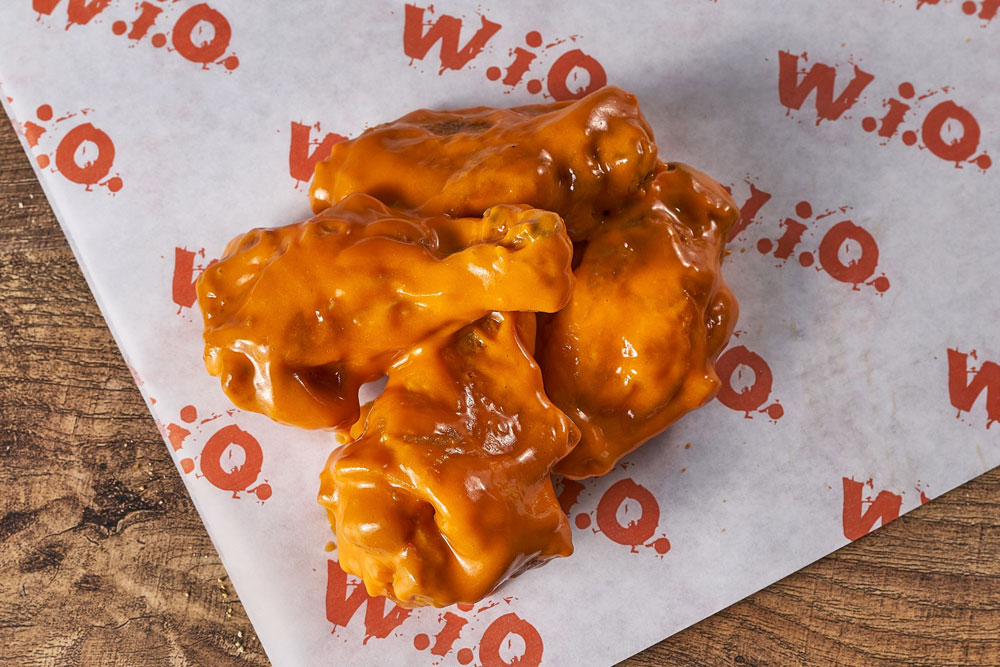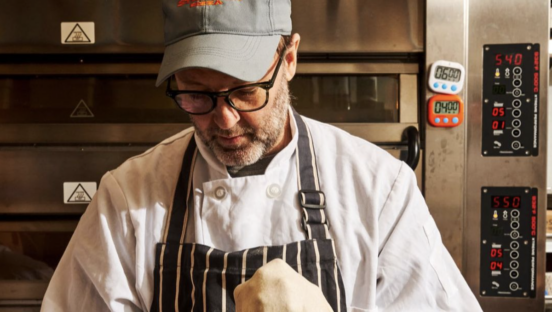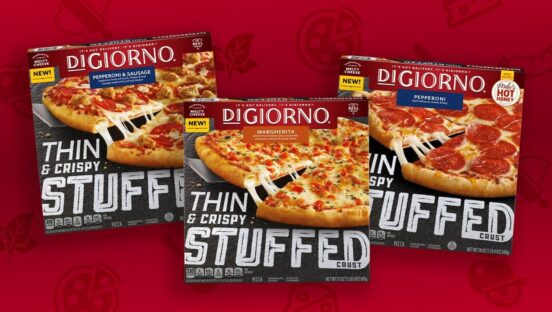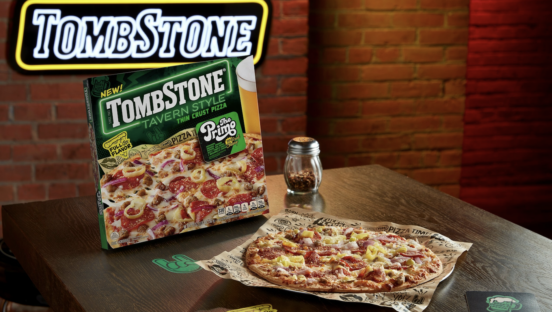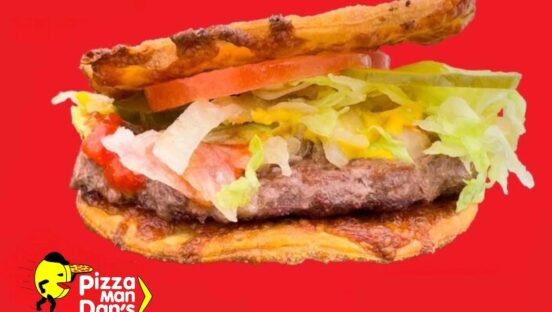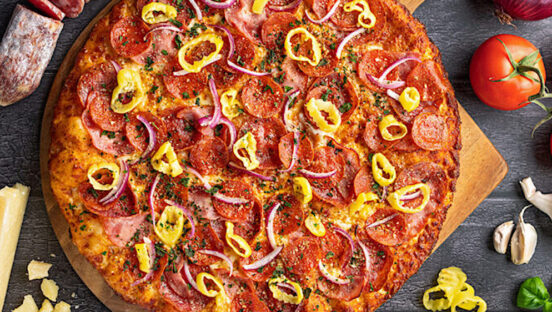By Tracy Morin
No longer are plant-based proteins solely of interest to vegetarians and vegans. Thanks to a rise in health consciousness and environmental responsibility among consumers, more people are flocking to meat alternatives—yes, including even hardcore carnivores. And you know it’s hit the mainstream when even fast-food giants like Burger King are hopping aboard the plant-based train.
“Plant-based options are the fastest growing sections on pizza menus and part of a larger trend in foodservice in general,” notes Daniel Levine, trends expert, keynote speaker and director of The Avant-Guide Institute in New York. “What was once marginalized as ‘vegetarian’ is now being normalized by being called ‘plant-based’—and, for pizza, this includes vegan cheese, vegetable-based crusts and meatless ‘meats.’”

Columbus, Ohio-based Donatos Pizza offers plant-based sausage at all of its locations, plus the option of a cauliflower crust.
Adding Plant-Based Proteins
When Dan Snowden, executive chef at Chicago’s Pizza Lobo, realized that more customers were seeking plant-based proteins, he sought items that offer great taste and texture but are also easy to use for staff. Partnering with manufacturer MorningStar Farms, he created the “Anise?! Nice.” pizza, topped with fennel, mozzarella and Italian Sausage Style Crumbles, which he chose for its rich fennel flavor, reminiscent of traditional Italian sausage. “I play up the fennel flavor by using a fennel cream, caramelized fennel, fennel fronds and fennel pollen,” Snowden says. “The pizza has been very well-received by customers, enjoyed by vegetarians and meat eaters alike. In fact, many typical Chicago meat eaters are ordering and loving the pizza and are surprised to learn that the sausage topping is plant-based!”
Columbus, Ohio-based Donatos Pizza, with 161 restaurants in 10 states, now offers plant-based sausage at all of its locations, including three signature pies on the new option of a cauliflower crust: Cauliflower Bruschetta, Cauliflower Garden and Cauliflower Heat. Customers can also add the plant-based sausage as a topping to any of its other pizzas and crusts. Donatos, too, chose to work with a purveyor to provide the sausage, streamlining operations. “It makes more sense for us to rely on our business partners to provide plant-based meat options; they specialize in this and spend tremendous resources to develop these products,” says Tom Krouse, CEO of Donatos. “As consumer interest in plant-based options continues to grow, it’s important to have options on your menu to provide for more individual choice, and the response has been overwhelmingly positive from our customers.”
“What was once marginalized as ‘vegetarian’ is now being normalized by being called ‘plant-based’—and, for pizza, this includes vegan cheese, vegetable-based crusts and meatless ‘meats.’”
— Daniel Levine, The Avant-Guide Institute
Meanwhile, the 10-location Amici’s East Coast Pizzeria, based in San Mateo, California, worked with both manufacturer Beyond Meat and animal-rights organization PETA to develop the One Step Beyond specialty pie, with mozzarella, Beyond Meat sausage, roasted red bell peppers, red onions and wild baby arugula (with Daiya vegan cheese optional). “We thought it was a good thing to do, with more people going vegetarian and more concerned about animals and the environment,” explains Peter Cooperstein, president of Amici’s. “A contact at PETA had suggested some plant-based meat substitutes, and we tried many different samples—after all, we’re still a business and wanted to add something that tastes great and will sell!” As Amici’s makes its own pork sausage, staff members season the substitute as they would the real thing—and Cooperstein says the end product is so convincing, you’d never think it wasn’t real sausage.
Similarly, Burke Corporation decided to add plant-based meats to its lineup for 2020 after observing some key changes in consumer habits and diets. Marketing manager Amy Thielking points out that using fully cooked premade meat alternatives allows for convenience, consistency and savings on labor. And Mike Dougherty, Burke’s VP of sales and marketing, notes that operators can enjoy versatility through different varieties, from Italian to chorizo.
“Our research showed that plant-based has grown more than 300% in the last year,” Thielking says. “Most of our customers simply offer it as an alternative protein option, and you can use them anywhere traditional meat would go. The response has been great; orders are growing week by week.”
Helpful Hints
Operators share some key lessons they’ve learned when working with plant-based alternatives:
“Have a grasp of how differently a plant-based protein is going to react in a pizza oven. My pizzas fire for six to seven minutes at about 600º, so I leave the Italian Sausage Style Crumbles frozen rather than thawed, so they stay succulent and moist. Also, you need to adjust for fat content, so you might have to add a little bit of olive oil to make it the equivalent of what you’d expect from a meat protein.” —Dan Snowden, executive chef, Pizza Lobo, Chicago, IL
“With our new plant-based sausage, we wanted to make sure that it was savory and complementary to our family-recipe sausage that we’ve served for 56-plus years. We also needed to make sure that there were no operational challenges from a prep or shelf-life standpoint. We’ll continue to consider all possibilities for additional plant-based toppings—for our pizzas, but also for our subs, salads and wings.” —Tom Krouse, CEO, Donatos, Columbus, OH
“Aside from pizza toppings, a couple of other things are working very well for us: We make pastas with Beyond Meat sauce and offer Sloppy Joe Sliders as an appetizer, which are very popular. Keep in mind that plant-based alternatives can be twice as expensive as traditional meat—you’re not going to save money by offering them, but they do help bring in more customers.” —Peter Cooperstein, president, Amici’s East Coast Pizzeria, San Mateo, CA
“On our first menu, we simply said, ‘Ask about our vegan variations,’ but guests didn’t notice, and staff didn’t always remember to suggest them. When I started a separate vegan menu with just four pies, it took off. Now, we have vegan soups, desserts, ice cream, wines and beers—even vegan sugar for our homemade limoncello. Vegans love it and thank us.” —Paulie Gee, owner, Paulie Gee’s and Paulie Gee’s Slice Shop, Brooklyn, NY
Going It Alone
On the other hand, some pizzeria owners have chosen to create their own meat alternatives in-house. At Denver-based Hops & Pie, vegan options comprise 15% to 20% of food sales, with smash hits such as vegan ranch, vegan sloppy joe (called Sloppy Jane) and smoked tofu gracing the menu. “From day one, we had vegan cheese and our extremely popular in-house smoked tofu as pizza toppings,” says owner Drew Watson. “From there, we added housemade vegan Sicilian sausage and our Sloppy Jane; our interpretation of a sloppy joe has smoked tempheh, mushrooms and other ground vegetables cooked down in a sloppy joe-style sauce.”
At Paulie Gee’s in Brooklyn, New York, adding meat alternatives from day one also felt like a must to serve the area’s large vegan population. He initially began with a storebought vegan sausage but changed his approach when one day an employee brought in some leftover seitan-based “turkey” he’d made. “It tasted so much better than what we were serving, so now we make it regularly,” says owner Paulie Gee. “It’s a simple recipe, with vital wheat gluten, water and nutritional yeast, plus we added fennel seed to get that Italian sausage flavor.”
Vegetarians or vegans can substitute Gee’s seitan sausage on any pie, and it plays a prominent role on his vegan menu, along with housemade cashew ricotta on pies like the In Ricotta Da Vegan. And, with his vegan sausage, Gee doesn’t need to parbake the product beforehand, as he does with traditional sausage; chefs simply make the product, refrigerate, and place on the pie before cooking. He even offered jackfruit “meatballs” for a time and is looking to reintroduce them. However, at the new Paulie Gee’s Slice Shop around the corner, Gee takes a different approach to suit his simpler menu, working with The BE Hive to offer toppings like vegan pepperoni and sausage, alongside vegan cheeses from Follow Your Heart and Numu.
For Watson, it’s all about offering something for everyone at Hops & Pie—but creating alternative meats does require extra care to make sure the end product is on point. “We look to popular ingredients and ask ourselves if there’s a way for us to create in-house a vegan substitute of a traditional meat offering,” he says. “The main consideration in creating vegan foods is to make sure it has a palatable texture. You can get so caught up in making something into a vegan product that the flavor gets destroyed on the way, or it just feels weird on your palate when you’re eating it.”

Vegetarians and vegans can substitute seitan sausage for pork on any pizza at Paulie Gee’s in Brooklyn.
Meat-Free Marketing
When catering to vegans and vegetarians, meat alternatives practically sell themselves—but you still need to get the word out about these options (and even try to convert some carnivores). Donatos has taken traditional routes, with paid advertising via TV, print and digital ads, but the company has also met with food bloggers and Instagram users to have them try the new pizzas and share their authentic responses with followers. “Our TV spot was also more nontraditional, as we ‘punked’ our actors by feeding them the new cauliflower crust signature pizzas before they thought they were going to read lines for the spot and recorded their actual responses to the new pizza,” Krouse says. “They could not believe they were eating cauliflower crust or plant-based sausage!”
“As consumer interest in plant-based options continues to grow, it’s important to have options on your menu to provide for more individual choice, and the response has been overwhelmingly positive from our customers.”
— Tom Krouse, Donatos
Thielking recommends treating your meat alternative options like limited-time offers, letting customers know they’ve been added to the menu through table tents, menu inserts, or clings and signage by the ordering counter. “You can even host an event in your pizzeria to have some interaction with customers,” she suggests. “You might try a ‘Can you taste the difference?’ challenge.”
Meanwhile, Cooperstein has found that a combination of social media and suggestions by phone order takers and in-house servers help boost sales for meat alternatives. In fact, even the fast-food chains have helped with marketing, thanks to all of the buzz surrounding plant-based alternatives in major brands like Burger King. “That’s actually been helpful for us, as it builds brand awareness for these products,” Cooperstein notes. “When we put them on our menu, we started getting orders right away—and there’s been zero negative feedback yet.”
Tracy Morin is PMQ’s senior copy editor.




